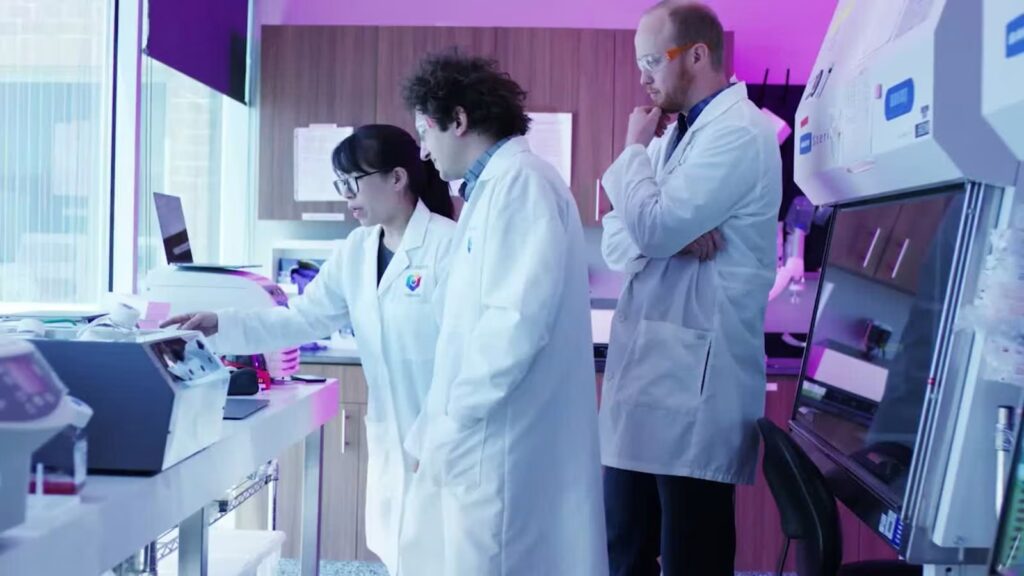
With at least seven of its programs expected to begin human trials or read out clinical data during 2025, artificial intelligence (AI)-based drug developer Recursion Pharmaceuticals says it has begun a “ClinTech” effort that applies AI beyond drug design and discovery, toward the way it approaches clinical trials.
“First, it’s really around smarter trial design programs. Second, it’s around accelerating enrollment. And the third is around enhancing evidence generation,” Najat Khan, PhD, Recursion’s chief R&D officer and chief commercial officer, told GEN Edge. “Most TechBio companies are focused in the drug discovery space. But we actually have a pipeline in development, and 65 to 70% of the time and money is spent in clinical development,” Khan said. “We want to be first in class, best in class, and best in industry—not just using AI in discovery, but also in development.”
[Recursion is among AI drug developers that use “TechBio” to describe their tech-influenced approach to drug development, with the company summarizing its approach as “decoding biology to industrialize drug discovery.”]
In terms of trial design, Khan said, Recursion is using real-world data to simulate its clinical trials before launching them: “What that means is you’re simulating what is the right patient inclusion and exclusion criteria. You’re leveraging all of the multimodal data and causal AI to determine who are the right patients, so enriching the population. And we’re also estimating things such as probability of operational success before we hit go, before we even start the study.”
Recursion reasons that it can increase the effectiveness of its studies through more precise selection of the right patients, while driving greater efficiency through smarter protocol design that minimizes amendments and addresses the feasibility of trial operations.
In seeking to advance patient enrollment, Khan said, Recursion uses real world data and machine learning algorithms to predict hotspots of where patients are likely to be found, aiming to improve upon the low 4% of eligible patients who enter trials.
Another use of AI in trial design is pursuing enhanced generation of evidence: “When you have open label studies for rare diseases, you have a single arm. Can you contextualize the natural history of the patients better, and also the natural course of treatment for the patients better?” Khan rhetorically asked. “This is something where we will engage regulators, etcetera, to be able to augment the package that we are generating using some of these approaches.”
Oncology programs
Recursion is leveraging AI-based trial design in three of its clinical phase oncology programs:
- REC-3565, a Phase I small molecule MALT1 inhibitor being developed for multiple blood cancer indications.
- REC-1245, a Phase I treatment for biomarker-enhanced solid tumors and lymphoma that is a selective degrader of RNA binding motif protein 39 (RBM39), a novel CDK12-adjacent target identified by the company’s Recursion Operating System (OS) platform.
- REC-617, a Phase I/II CDK7 inhibitor being developed to treat multiple advanced solid tumor indications.
The company’s fourth oncology program, REC-4539, is set to dose its first human patient during the first half of this year. REC-4539 is an LSD1 inhibitor designed to treat small-cell lung cancer, and according to Recursion is the first LSD1 inhibitor that is designed to be reversible and central nervous system (CNS) penetrant.
Recursion rang in 2025 by announcing January 7 that it received two regulatory clearances for early-phase studies. The FDA has cleared the company’s IND application to launch a Phase I/II clinical trial of REC-4539, while the U.K. Medicines and Healthcare Products Regulatory Agency (MHRA) has cleared a clinical trial application (CTA) for a Phase I study of REC-3565, set to launch during this quarter.
REC-3565 stands out from other MALT1 inhibitors in clinical development, Recursion says, through its ability to avoid inhibition of uridine diphosphate glucuronosyltransferase 1A1 (UGT1A1), thus potentially reducing hyperbilirubinemia risk and allowing a better combination profile with drugs that have known liver toxicity issues. If approved by the FDA, REC-3565 would be the first MALT1 inhibitor to be authorized by the agency.
REC-1245 is under study in a Phase I/II trial (NCT06678659) that dosed its first patient during the fourth quarter of 2024, following FDA clearance of Recursion’s IND in October. The trial is active and enrolling at five U.S. sites, with data set to be read out in the first quarter of 2026. REC-1245 is Recursion’s first program to emerge from end-to-end use of Recursion OS to identify a novel target and new chemical matter, which moved from target ID to IND enabling studies in under 18 months with ~200 compounds synthesized.
REC-617 is under study in the Phase I/II ELUCIDATE trial (NCT05985655). In December, Recursion announced positive initial monotherapy dose-escalation data from ELUCIDATE showing a confirmed partial response in a single patient with platinum-resistant ovarian cancer, with a decrease of more than 30% in the sum of the longest diameters of target lesions, with no new lesions and no progression of non-target lesions. The patient showed durable response ongoing after more than six months of treatment. Another four patients showed stable disease for up to six months of treatment.
“While RXRX’s AI drug discovery platform is interesting, it will take time to get fully validated through more clinical readouts,” Jefferies analyst Dennis Ding wrote December 10 in a research note. “In the meantime, we are quite intrigued w/ the CDK7 inhibitor that was tucked in via the EXAI merger.”
During the first half of this year, Recursion plans to launch combination studies assessing REC-617 with as-yet-undetermined drugs, while continuing with monotherapy dose escalation (daily and twice-daily) studies.
Combining pioneers
Recursion gained control of REC-617 when the company combined with the drug’s original developer Exscientia, also a pioneer in AI therapeutic development, in a deal completed in November. The value of the Recursion-Exscientia deal has not been formally disclosed by the companies, though Reuters and CNBC reported the transaction as being $688 million when it was first announced in August 2024.
The business combination created a trans-Atlantic AI powerhouse with a pipeline of more than 10 clinical and preclinical programs, 10 programs in advanced discovery phases, and more than 10 additional programs partnered with four biopharma giants—Bayer, Merck KGaA, Roche and its Genentech subsidiary, and Sanofi.
Those collaborations are all expected to progress in 2025, Recursion CEO Chris Gibson, PhD, told GEN Edge in a brief Q&A with reporters conducted during the recent 43rd Annual J.P. Morgan Healthcare Conference: “We’re going to have an increasing cadence, I suspect, of milestones for those programs, moving to the next stage, advancing towards the clinic, and I think that’ll be really, really meaningful.”
A fifth biopharma giant, Bristol Myers Squibb (BMS), now oversees an Exscientia-designed, potentially first-in-class selective protein kinase C (PKC) theta inhibitor that is in Phase I study for immunology indications.
Khan said Recursion has completed its integration with Exscientia and will integrate Exscientia’s precision design capabilities in all Recursion programs going forward. Recursion is progressing with planned operational “synergies” that the company has said are expected to generate annual savings of approximately $100 million. Those synergies include job reductions that have lowered the combined company’s headcount down to roughly 800–compared with 900 pre-combination.
Recursion says it will provide investors with additional guidance on the synergies in the second quarter.
“Now that the companies have come together, it gives us an opportunity to look across programs, across our operations, across our sites, etcetera, and to really say, how do we be disciplined and data-driven? How do we double down on where we can win? You will see that discipline continuing with the combined entity,” Khan said. “We have a lot to do. So, we want to do things where we have the best opportunity to win.”
In November, Recursion and Exscientia said the combined company received approximately $450 million in upfront and milestone payments from biopharma partnerships launched, with potential to receive more than approximately $20 billion in additional milestone payments before royalties.
More than half of that total consisted of the up-to-$12 billion partnership launched by Recursion in 2021 with Roche and its Genentech subsidiary. The companies agreed to initiate up to 40 programs in “key areas” of neuroscience and an unspecified oncology indication. In August, Recursion disclosed it received from Roche and Genentech a $30 million “acceptance fee” for the completion of the first neuroscience “phenomap” or map intended to illustrate the inferred relationships amongst perturbation phenotypes in a given cellular context.
“More maps and programs this year is our focus with Roche Genentech,” Khan said.
Rare disease programs
Oncology is one of Recursion’s two therapeutic areas of focus; the other is rare diseases. “The nice thing about our multimodal platform is it’s pretty disease agnostic,” Khan asserted. “It’s not just oncology and rare diseases. If we see insight that we validate and we have conviction against, I can see us doing things outside.
“I will say, though, drug discovery and development is hard,” she added. “We don’t want to spread ourselves too thin. We want to be very disciplined and focused. We have quite a few programs and we want to execute them well. So it’s a balance.”
In rare disease, Recursion expects to release data from three programs this year while launching a fourth into human trials. Next month, the company plans to present mid-stage clinical results for its lead rare disease program REC-994, through a “late breaker” oral presentation at International Stroke Conference 2025 (ISC25), set for February 5–7 in Los Angeles.
REC-994 is an oral small molecule superoxide scavenger being developed to treat symptomatic cerebral cavernous malformation (CCM). REC-994 met the safety and tolerability primary endpoints of the Phase II SYCAMORE trial (NCT05085561), according to positive topline data announced in September.
During the first half, Recursion plans to read out safety and early efficacy data from the Phase Ib/II trial TUPELO trial (NCT05552755) assessing REC-4881. The oral non-ATP-competitive, allosteric small molecule inhibitor of MEK1 and MEK2 is being developed to reduce polyp burden and progression to adenocarcinoma in people living with Familial Adenomatous Polyposis (FAP).
Also in the first half, the company plans to read out PFS6 futility analysis data from the Phase II/III POPLAR-NF2 trial (NCT05130866) of REC-2282, an oral, CNS penetrant small molecule pan-histone deacetylase (HDAC) inhibitor designed to treat progressive neurofibromatosis type 2 (NF2)-mutated meningiomas. There are currently no FDA-approved drugs for the treatment of patients with NF2.
Some time this year, Recursion and joint venture partner Rallybio expect to launch IND enabling studies of REV102, an oral, small molecule ENPP1 inhibitor being developed for the treatment of hypophosphatasia (HPP). The companies presented nonclinical data in September showing that ENPP1 inhibition was a potential therapeutic approach for treating HPP.
C.diff, IPF, and PI3Kα
Outside of cancer and rare disease, Recursion’s pipeline consists of:
- REC-3964—An oral, potential first-in-class, non-antibiotic small molecule designed to selectively inhibit Clostridioides difficile (C.diff) toxin B (TcdB) in the gastrointestinal tract. Recursion plans to read out data from the Phase II ALDER trial (NCT06536465) in the first quarter of 2026.
- REC-4209—an oral, reversible, potential first-in-class candidate for idiopathic pulmonary fibrosis (IPF) whose target is undisclosed except for its name of Epsilon. IND-enabling studies are ongoing, with preclinical efficacy shown in a bleomycin lung fibrosis mouse model.
Also in the pipeline are about 10 advanced discovery programs, one of which is set to start clinical trials during 2025—a mutant-selective PI3Kα H1047Ri candidate to be developed for an as yet undisclosed indication. Khan said Recursion aims to develop a candidate that avoids the adverse events associated with other PI3 candidates, such as hyperglycemia, while demonstrating effectiveness against disease.
Recursion says the PI3Kα H1047Ri candidate will be about 100 times more selective than wild type PI3Kαs, the first of which won FDA approval in 2014 for certain blood cancers (Gilead Sciences’ Zydelig® [idelalisib], indicated in combination with Genentech (Roche)/Biogen’s Rituxan® [rituximab]). Five years later, Novartis won its first FDA approval for the first PI3K indicated for some solid tumors (Piqray® [alpelisib], indicated in combination with fulvestrant [AstraZeneca and generic versions]). Novartis also markets an oral alpelisib as Vijoice®.
A recent sign of growing biopharma interest in PI3Kα compounds came earlier this month, when Eli Lilly announced plans to acquire Scorpion Therapeutics’ PI3Kα inhibitor program STX-478 for up to $2.5 billion cash, including upfront money and payments tied to achieving regulatory and sales milestones. STX-478 is a once-daily oral, mutant-selective PI3Kα inhibitor currently being evaluated in a Phase I/II clinical trial for breast cancer and other advanced solid tumors.
“The question is, if you make it more mutant selective, can you actually mitigate some of those side effects?” Khan said. “We’ll be sharing some of the information on some of our preclinical data soon.”



